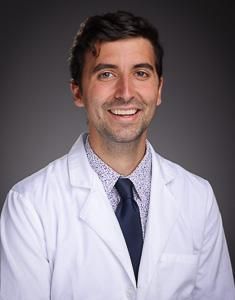
Jonathan
Kusner
Positions
- Fellow, Cardiovascular Disease Fellowship
- House Staff
Start Year: 2024
Basics
- Hometown: Iowa City, IA
- University/college: Loyola University Chicago
- Medical school: Harvard Medical School
- Residency: Duke University
Fellow Perspective
What are your career plans in cardiology?
I hope to focus clinically on the management of structural heart disease. Following training, I would like to work in an academic setting to perform structural heart interventions and round in the cardiovascular intensive care unit. Academically, I hope to lean on my background in device development and venture evaluation/formation to develop/contribute to an academic innovation hub where I would help to identify and qualify unmet medical needs and then work with teams across the academic enterprise to translate solutions to patients. I would like to remain primarily clinical as I believe my innovation work is best informed and supported by my continued pursuit of clinical excellence.
Why did you choose Duke for your cardiology fellowship training?
I won’t be able to capture everything concisely on this page. Often the decision of training involves a good amount of nuance and weighing priorities; but this was not the case for me when selecting fellowship programs because Duke stood out as an exemplar in how they valued my personal and professional priorities. Everything begins with the people; the people at Duke are incredible and deeply integrated. Both within the division and beyond, people have been part of one another’s lives for years, whether they went to residency together (at Duke or elsewhere -and come together again at Duke) or have been on faculty for years. This network of relationships makes practicing at Duke very rewarding. People trust and rely on one another. It is a trust that has been earned over years and makes the work environment so inviting. People look out for one another. In addition to these cultural themes, Duke leads in the typical professional development domains. We excel at research and have ready access to the Duke Clinical Research Institute, our faculty have strong representation amongst prominent leadership positions within academic cardiology and practice sponsorship with fellows, we are consistently one of the largest transplant centers in the country which has a massive trickle-down footprint on volume and case complexity. I would be more than happy to speak through individual circumstances and help contextualize reasons to strongly consider Duke for your cardiology fellowship training.
What advice might you offer residents looking at fellowship programs?
Ask more about our paid moonlighting - it’s a great way to see how our leadership cares for the fellows; they found the money to make night coverage a paid opportunity and allow us to select dates that work for our individual and family schedules - rather than the frequent GME standard of night call being an unpaid expectation of fellows.
What do you enjoy doing in the Triangle area outside of work?
The BEST thing is difficult to pull out because there are so many frontrunners; the incredible things about Durham include the greenery (spring blooms very early and the diversity of different flowering plants ensures color throughout summer and into fall, the pines tower so tall that, together with the trees under them, two canopies form and give great depth to the forests [which are everywhere!]). The people are grounded and kind, there are many places that are cozy and great for hanging out - the city is very easy to live in (no traffic, free/cheap parking, places often have in-unit laundry, etc) and is generally very affordable on a resident salary. The food is very good and there are tons of opportunities to shop local (farmers markets, CSA's). It's a lovely place.